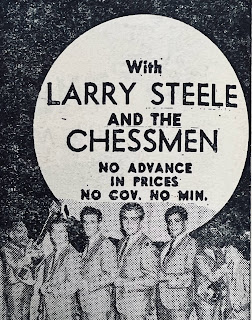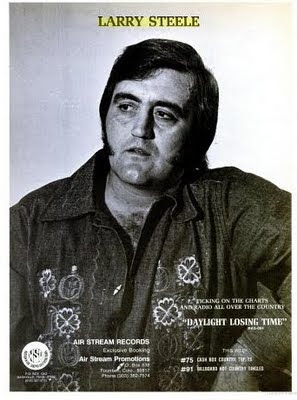Interview with Rod Steele and Kim Steele conducted July 2011.
For
as long as anyone in Larry Steele's family could remember, he was a
performer - a destiny that was carved out at an early age.
"He
won a Star Search contest in the 5th grade, in Longmont," said his
brother Rod. "He actually taught himself how to play the guitar, and
then there was no stopping him."
Born in Englewood in
1937, to Lester and Ruth Steele, music was a way to entertain the family
in their Castle Rock home, where Larry was the oldest of seven boys.
"Mom had a beautiful voice," Rod Steele said.
After
Larry graduated from Castle Rock High School, he got married, then
moved to New Mexico, to work with a then-unknown singer, Glen Campbell.
"Glen was from Albuquerque, and so he started playing with him. Then he got drafted."
After
serving in the U.S. Navy for four years, Steele picked up where he left
off and came back to Colorado, where he started jamming in bi-racial
rhythm and blues bands, including Larry Steele and the Chessmen.

(1964 Denver Post advertisement)
"Then one day John Capps from
K-ARK records in Nashville shows up at one of his shows, and asks if he
wanted to do a demo," Rod Steele said.
Steele was
writing his own r&b-tinged songs at the time, so he pitched
several to the label, who decided to groom him as its next superstar.
Released on the K-ARK Discoteque label (106), his first recording was an EP of six songs.

Side One:"My Lucky Day" "Last Night" "Foolish Pride"
Side Two: "Up The Lazy River""Stormy Weather" "Birth of the Blues"
(listen to samples)
Throughout the late 1960s Steele would go on to
release several singles. In a risky move, he then decided to switch to
country music.
K-ARK proceeded to get the word out
about their new country music discovery, with the release of an LP, and a
series of articles in many magazines, including
Billboard.
Going to Kansas City
K-ARK 600
"Larry
Steele, a Cherokee Indian, from Colorado Springs, and a pop artist,
switched to country on his newest cut in Nashville last week for K-ARK,
called "I'm Not Crying Mister." -
Billboard, September 18, 1965
A week later, the trade magazine ran a picture of Steele.
 Billboard
Billboard - September, 25 1965
Steele would release several singles on the label:
K-ARK 648 – "Baby Workout" / "My Lucky Day"
K-ARK 659 – "Ramblin’ Man" / "I Ain’t Crying Mister"
"I Ain't Crying Mister" peaked at #43 on the
Billboard Hot Country singles chart on January 22, 1966.
K-ARK 802 – "Hard Times" / "Apple or a Pair"
K-ARK 837 – "Hello Satan" / "Tall, Down on my Knees"

K-ARK 875 – Larry Steele and the Wranglers – "How
About it Young Lady" / "Three Men on a Mountain" K-ARK 893 – Larry
Steele and the Wranglers – "Yesteryear’s Man" / "Plain Simple Life"
Sometime
in 1966 Steele aligned himself with the Hilltop label, the Pickwick
country project. According to the April 2, 1966 issue of
Billboard,
Larry Steele, along with Johnny Paycheck, and Lloyd Green were all
signed with the company. The story mentioned an album project, but it
appears Steele only released three singles with the label: "Why Don’t
They Want Me" / "Little Jimmy" (Hilltop 3011), "Little Brenda" /
"Daylight Losing Time" (3012), and "Little Folks" / "Little Jimmy"
(3014).

Photo courtesy of Kim Steele
"He
had always been kinda hillbilly," said Rod Steele. "It didn’t matter
what he played, he just played it - he just loved music. Larry was ahead
of his time. When he went into country, people were just starting to
hear that rhythm that you hear now in country. But interestingly enough,
he really didn't consider himself a country singer."
In
1969 Rod Steele joined his bother, when Larry Steele was asked to
perform in Vietnam. "I played drums for him. We did that for about three
months, playing for the troops."
After his contract with K-ARK expired, he came back home to Fountain, where he decided to stay put in Southern Colorado.
"He
had nine kids at this time, and I think he wanted to find something
more stable," said Rod Steele. "He was playing at the Caravan Club in
Pueblo, and Bob Sloan, who was the owner, told him that he wanted to get
out of the nightclub business. He asked Larry if he wanted to buy the
club. So he did."
Larry Steele didn't have any
experience running a nightclub, but he and his wife ran the bar from
1971-1974. "He really didn't make any money out of it, and with nine
kids to feed, he needed to find something else to do."
In
1972 he caught a big break by opening for Buck Owens at Red Rocks. He
also signed with the Johnny Seeley record label, Airstream, based out of
Fountain.
 Billboard
Billboard - Nov. 10, 1973
Steele
would go on to release "Things Money Won't Do" / "Goody, Goody, People"
(Airstream 101), and "Little Wine, Little Gin" / "Hold On" (Airstream
003), which received a favorable write-up in the June 8, 1974 issue of
Billboard, as a "recommended" country song.
Seeley's
intense promotion of Steele resulted in numerous write-ups on the
artist. That same year, as part of a full page feature on Colorado
record labels,
Billboard highlighted Airstream, and its star client, Steele.
"Seeley
had been in the music business for about 20 years, working clubs,
bookings and the like, when he decided to form his own label. He knew
Steele's talent, and he plunged ahead in the mountainous area 10 miles
south of Colorado Springs. The initial recordings were done at the Buck
Owens Studios in Bakersfield, and all of the backup musicians are the
Buckaroos." -- Billboard - July 27, 1974

On Dec. 7, 1974, his third single "Daylight Losing Time" (Airstream 004) hit the
Billboard Hot Country Charts, peaking at #90. The single stayed on the charts for five weeks.
 "Watermelon Man"
"Watermelon Man" (note spelling of composer's first name)
Side B of "Daylight Losing Time" - the Herbie Hancock-penned
In
1975 tragedy would strike when Larry Steele was involved in a
motorcycle collision with a truck. "The doctors told us that he would
never walk again - but he proved them wrong," said his daughter, Kim.
Larry Steele continued to race stock cars, and take part in rodeo competitions, and he never gave up on his music.
"My
dad was always playing his guitar and writing on a tablet," Kim Steele
said. "We were always dancing and singing, and the record player was
always going."
In 1977 he packed up his family and moved to Tennessee, where he secured a position writing songs for Acuff-Rose Publishing.
"You
had to live within a 30 mile radius of Nashville to work for them,"
said Kim Steele. "We all moved, but that's when mom and dad went
through their divorce."
Larry Steele would later
remarry, and move to Alba, Missouri, in 1998. His knees had always given
him some trouble, as a result of the motorcycle accident, but it never
kept him from performing - until a show in Florida, opening for Mark
Wills.
"He was doing this concert, and the pain was too
much. He had already said he couldn't do anymore operations, so
gangrene set in, and he lost his leg," said Rod Steele.
The
next few months are a blur for the family. Nobody saw any signs of
depression, or suicidal thoughts. Larry Steele continued to write
music, and keep up with his family.
"I got the call
that my dad shot himself," said Kim Steele. "I got in the car and drove
straight from Colorado to Missouri. "I was able to get there before he
died."
Larry Steele passed away March 6, 2003. He was 65 years old.
"I
still don't know why he did it. There was just something inside of him.
I don't know," said Rod Steele. "I think it took a toll on him."

Larry Steele (year unknown)
Photo courtesy of Kim Steele
"The night he shot himself, on the back of his will, he was writing a song," said Kim Steele.
"You
know, Larry really didn’t want to be a star, but he could have been
one," said Rod Steele. "He chose not to, nobody knows why."
Larry Steele is buried in Greenlawn Cemetery, in Berthoud.
COMING NEXT POST: On top of Pikes Peak












